EVERYDAY LIFE IN CHINA
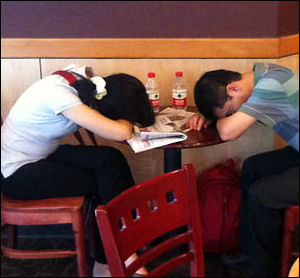
Many Chinese over 30 have experienced great upheaval, change and twists of fortune in their lives and are quite happy with where they have ended up. One official in Shanxi told James Fallows of the Atlantic monthly, “Do you understand how different this is. My mother has bound feet...If it had not been for Deng Xiaoping, I would not be sitting here right now wearing a neck tie and talking to a foreigner.” He then described how he developed self confidence serving in a labor gang as a teenager during the Cultural Revolution.” Some Sichuan earthquake survivors have said that the earthquake was no worse than what they went through during the Great Leap Forward in the 1950s.
Ian Johnson wrote in the New York Review of Books, “One of the most striking features about daily life in China is how much of what one encounters has been appropriated from elsewhere. It’s not just the fake iPhones or luxury watches—pirated consumer goods are common in many developing countries. In many Chinese cities, foreign ideas and concepts are constantly being used to shape the external reality, from clothes and pop music to contemporary art and film. As The New York Times reported this week, there is even a smartphone CEO who consciously models himself on Steve Jobs. [Source: Ian Johnson, New York Review of Books, June 6, 2013]
Many Chinese complain that it is hard to get ahead these days no matter how hard you work. “Watermarks, a film by Luc Schaedler and Markus Schiesser, explores lives of a handful of ordinary Chinese. A. E. Clark wrote: We follow one apparently cheerful, practical woman to the industrial zone in Inner Mongolia to which she and her husband have returned after leaving her toddler 600 kilometers away with her in-laws. The industrial zone calls to mind Blake's dark, Satanic mills., except that Schaedler's cinematography can reveal a hypnotic beauty in the bulldozers of a strip mine. In a quiet moment back in their dormitory room, the woman says, "You ask me about my dreams? [laughs nervously, then wipes her eye] What kind of dream could I have under these conditions? Just . . . to be realistic . . . I work here, save some money, buy an apartment and settle down here. A bigger dream will not come true. Peace and security for the family . . . just an average life. I don't have dreams. . . .“Later she remarks, "I feel relieved after speaking about it. If you hadn't asked, I would never have talked about it. It would still be buried deep in my heart." [A. E. Clark, Paper Republic, September 11, 2015]
Books: “The Corpse Walker, real Life Stories, China From the Bottom Up” by Liao Yiwu (Pantheon Books, 2008) a collection of oral histories from a Chinese, mostly Sichuanese, with strange jobs or circumstances; “Shanghai Homes: Palimpsests of Private Life” by Jie Li, Columbia University Press, 2014. A promotion blurb for “China Tripping: Encountering the Everyday in the People's Republic” reads: This unique book is the first to bring together a group of influential China experts to reflect on their cultural and social encounters while travelling and living in the People’s Republic. Filling an important gap, it allows scholars, journalists, and businesspeople to reflect on their personal memories of China.. China experts relate stories that are always interesting but also more: they tell not just anecdotes but telling anecdotes. Why are there no campus maps? (Because, if you don’t know where you’re going and why, you don’t need to be here.) What’s the allure of Mickey Mouse? (He could break all sorts of rules and get away with it.) What’s a sworn brother in China? (Somebody who fights for your honor even when you’re not looking.) [Book: “China Tripping: Encountering the Everyday in the People's Republic, edited by Jeremy A. Murray, Perry Link, and Paul G. Pickowicz (Rowman and Littlefield, 2019). Contributors include Anita Chan, Donald Clarke, Dru Gladney, Maggie Greene, Wendy Larson, Perry Link, Melinda Liu, Minxin Pei, Morris Rossabi, Vera Schwarcz and Jeffrey Wasserstrom]
See Separate Article HUKOU (RESIDENCY CARDS) factsanddetails.com ; RURAL LIFE IN CHINA factsanddetails.com ; CHINESE VILLAGES factsanddetails.com ; VILLAGES IN 19TH CENTURY CHINA factsanddetails.com ; URBAN LIFE IN CHINA factsanddetails.com ; HOME LIFE AND POSSESSIONS LIFE IN CHINA Factsanddetails.com/China ; CHINESE CUSTOMS Factsanddetails.com/China ; BAD MANNERS IN CHINA Factsanddetails.com/China ; EATING AND DRINKING CUSTOMS IN CHINA Factsanddetails.com/China ; CONSUMER CUSTOMS IN CHINA Factsanddetails.com/China
RECOMMENDED BOOKS: “It's All Chinese To Me: An Overview of Culture & Etiquette in China” by Pierre Ostrowski Matthew B. Christensen, Gwen Penner (Illustrator) Amazon.com; “China's Housing Middle Class: Changing Urban Life in Gated Communities” by Beibei Tang Amazon.com “Yin Yu Tang: The Architecture and Daily Life of a Chinese House”by Nancy Berline Amazon.com; “Family Life in China (2016) by William R. Jankowiak and Robert L. Moore Amazon.com; Good Luck Life: The Essential Guide to Chinese American Celebrations and Culture”by Rosemary Gong and Martin Yan Amazon.com; “Housing, Clothing, Cooking, from Daily Life in China on the Eve of the Mongol Invasion 1250-1276" by Jacques Gernet Amazon.com ; “China's Golden Age: Everyday Life in the Tang Dynasty” by Charles Benn Amazon.com; “Daily Life in Ancient China” by Mu-chou Poo Amazon.com; “Life in Ancient China” by Paul Challen Amazon.com ; “Daily Life in Shang Dynasty China” by Lori Hile Amazon.com
Borrowing in 19th Century China
Arthur Henderson Smith wrote in “Chinese Characteristics”: “Every foreign establishment has a great variety of articles of no special value in themselves, and often of no value at all — to their owner, but much prized by the Chinese. Such are the empty tins, which ought to accumulate in mounds, but which never do accumulate, for the reason that they undergo absorption by the Chinese, to whom they are most useful. The same thing happens to wrappings or casings of all sorts. Canvas bags, in which rice and coffee once reposed, are things of but short life. Boxes disappear, used "for kindling;" kerosine tins, so unsightly to the foreign gaze, are less repulsive to that of his common friends, the Chinese. His mats are just the thing for unnumbered uses, and they gently fade, like a summer's twilight. His stock of benches, provided for some special emergency, gets visibly smaller. They have been (temporarily) "borrowed," not to be returned. Diligent enquiry, if begun betimes, will lead to the recovery of a certain per cent. of them, but not to the recovery of all. They were “borrowed" under circumstances of peculiar need, by a friend of a friend of the boy's brother-in-law. He will look for them, and get them back, "chop chop." The poles on which summer mat-shed depend are not all in their place, at the advent of the warm breath of early summer. [Source:“Chinese Characteristics” by Arthur Henderson Smith, 1894. Smith (1845 -1932) was an American missionary who spent 54 years in China. In the 1920s, “Chinese Characteristics” was still the most widely read book on China among foreign residents there. He spent much of his time in Pangzhuang, a village in Shandong.]
The coolie does not know who could have' removed them — neither do you. But there is one thing which both of you do know perfeotly well, which is that you will never see those particular poles again. The same process of more or less gradual disappearance takes place in the kitchens of all of us, the only difference being that some of us are aware of it, and some of us are not. Every now and again some special article is not to be found. The boy has nothing to do with it, and the cook has been changed and he never saw it at all. A change of servants is a good time to take account of all varieties of household stock. The water jars are apparently short in number, but the servants never lend such things, and think one was taken by a foreign neighbour. The grass and weeds in your yard are -kindly gathered for you, by persons whose presence you do not desire, and not improbably at time when your attention is on other things. Your friends assist in getting in your flower crop, not stealthily, but openly and above board. You hesitate to roar, at a well dressed Chinese, who helps himself to some of the fruit which he happens to. espy, as he is leaving your premises; but for the moment, you consider him peculiar. He is not at all so, it is you who are peculiar, for the customs of the Flowery Land are in some respects, a trifle relaxed, and this is an example.
A friend of ours was called on by some Chinese, when he was not at home, but this was of no consequence — a mere matter of detail — as the leader of the party was himself quite “at home" in the foreign house. When the host returned, it was to find the Chinese visitors, led by the gentleman who was on very intimate terms, in one of the closets, where .they were admiring some fine specimens of foreign onions, to. a string, of which, one of the strangers helped himself, laying it down by the side of his chair till his departure. The foreigner was a trifle annoyed — as foreigners have a way. of being — and when all the Chinese party happened to step out for a moment, he calmly took the onions, replaced them in the closet, locked the door, and removed the key. When the guests rose to go, one Of them felt for the onions, and not finding them, was much perplexed. The moment he reached home, he sent his servant with a card, begging for three onions!
Daily Life in the Mao-Era
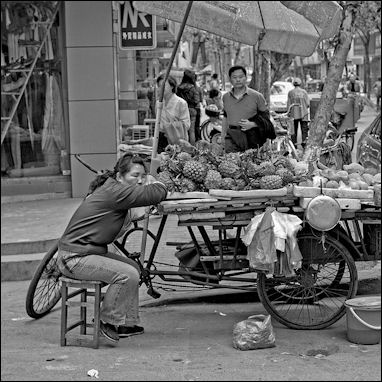
In the Mao era there was little crime, unemployment, or unplanned children. Everyone lived in identical nearly free apartments, earned the same salary (about $35 a month) and received free health care, insurance, utilities and free foodstuffs like flour, eggs and cooking oil. Families that lost stars according to a 10-star good behavior system lost privileges. Marriages were held in group ceremonies on January 1s. Children attended school from 5:35am to 8:00pm, and social life revolved around political study classes.
Before 1949 the Chinese economy was characterized by widespread poverty, extreme income inequalities, and endemic insecurity of livelihood. By means of centralized economic planning, the People's Republic was able to redistribute national income so as to provide the entire population with at least the minimal necessities of life (except during the "three bad years" of 1959, 1960, and 1961) and to consistently allocate a relatively high proportion of national income to productive investment. Equally important to the quality of life were the results of mass public-health and sanitation campaigns, which rid the country of most of the conditions that had bred epidemics and lingering disease in the past. The most concrete evidence of improved living standards was that average national life expectancy more than doubled, rising from around thirty-two years in 1949 to sixty-nine years in 1985. [Source: Library of Congress, 1987]
For decades, life in China under the Communist Party centered around tight-knit government work units that were responsible for everything from housing assignments to granting permission for marriage. The government controlled everything. Certificates were required to marry, divorce, have kids, retire, change jobs, travel inside the country, move, go abroad. Simple things such as buying a TV, getting a land-line telephone installed and renting or buying property were often an incredible hassle with a mind-boggling amount of red tape. Patience was required and it helped to have guanxi (connections). The supply of goods was dictated by quotas. You needed oil coupons to buy cooking oil, cotton coupons to buy cloth, grain coupons to buy rice. Now people can find their own jobs, buy what they want and travel where they want. When certificates are necessary they are easier to get.
Angie Eagan and Rebecca Weiner wrote in “CultureShock! China”: During the Maoist years, the mainland Chinese were almost all universally born in state hospitals or helped by state-funded midwives, attended state schools and lived out their lives in small, simple apartments or rural villages assigned by the state. They worked in jobs assigned by the state, used towels, clothes, washbasins and dishware manufactured by the state in a narrow range of utilitarian designs, and slept under the same state-assigned quilts. They sold through state-run stores, read newspapers published by the state, saw news and entertainment funded and controlled by the state, were married by the state and in the end, cremated and buried by the state. [Source: “CultureShock! China: A Survival Guide to Customs and Etiquette” by Angie Eagan and Rebecca Weiner, Marshall Cavendish 2011]
But despite this Chinese back then were “definitely not homogenous” as they are not today. “The authors have spoken with farmers who kept tiny patches of illicit tobacco growing right through the Mao years for extra income and some sense of independence. We’ve met children raised in the Mao years by aunts and grandparents, effectively ‘hostages’ held at home to ensure Communist Party loyalty while their diplomat parents, selected in part for language skills, worked abroad (such children, unsurprisingly, often grew up with mixed feelings about the Party). We’ve also met some ‘Young Princes’ — children and grandchildren of top Party leaders of the Mao era — who saw first-hand the corrupt cynicism that pervaded much of the top ranks and reacted variously by growing up as neo-idealist reformers,
See Separate Article CHINESE SOCIETY AND COMMUNISM: EQUAL IN POVERTY, WORK UNITS AND MODEL CITIZENS factsanddetails.com
Daily Life During the Cultural Revolution
During the upheaval of the Cultural Revolution from 1966 to 1976 people in Beijing burned their own books and smashed heirlooms. People were so afraid that the Red Guards would find antiques in their home, they would toss them into the river at night so no one would see. Records from 1972, taken at a grade school outside Beijing, show that math students were made to sing two revolutionary songs and study and discuss six Mao quotations for 25 minutes of each class. The remaining few minutes were spent doing math. [Source: Xiyun Yang and Michael Wines, New York Times, January 25, 2010 +++]
In 1967, a report urged forming special groups at the provincial and city levels to use every conceivable means to guarantee production each year of 13,000 tons of specially formulated red plastic required for the covers of Mao’s Little Red Book of quotations. The Conference on the Situation of the Special Plastic Used by the Works of Chairman Mao proclaimed that producing the plastic was our glorious political responsibility. +++
Pankaj Mishra wrote in the New York Times: “Often the biggest event was when a criminal was executed, when the whole town would become as lively as festival time. The writer Yu Hua told the New York Times he remembers the executions as the most thrilling scenes of his childhood, seeing the criminal kneeling on the ground, a soldier aiming a rifle at the back of his head and firing.... Books were hard to come by during the Cultural Revolution, or they would circulate in mutilated form, The writer Yu Hua said he read the middle of a torn copy of a novel by Guy de Maupassant (I remember it had a lot of sex, he said) without knowing its title or author. His formative reading experience was provided by the big character posters of the Cultural Revolution, in which people denounced their neighbors with violent inventiveness. [Source: Pankaj Mishra, New York Times, January 23, 2009]
The selling pigeons at an impromptu street market was seen as an obstacle to the triumph of socialism. According to a report filed by an official in 1966, crowds of 500 or more, corrupted by dreams of profit, were gathering every Sunday on a street in the city’s embassy district to ply a shameful trade. They were learning how to do business and raise money, the city official wrote. This is seriously harmful to the healthy growth of the successors of the proletariat revolution, the official said, and a waste of bird feed, too.
See Separate Article SURVIVING AND LIVING THROUGH THE CULTURAL REVOLUTION factsanddetails.com
Daily Life During the Deng-Era
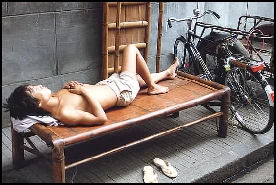
Since China embraced capitalist reforms life has become increasingly urbanized and Chinese are much like their counterparts in other industrialized countries: they commute, work in offices and live in anonymous apartment blocks. Among the worries that ordinary Chinese have are the high cost urban housing, education and future jobs for their children and inflation. Many complain about the conspicuous consumption of the nouveau riche and corruption among party officials.
In 1987 the standard of living in China was much lower than in the industrialized countries, but nearly all Chinese people had adequate food, clothing, and housing. In addition, there was a positive trend toward rapid improvements in living conditions in the 1980s as a result of the economic reforms, though improvements in the standard of living beyond the basic level came slowly. Until the end of the 1970s, the fruits of economic growth were largely negated by population increases, which prevented significant advances in the per capita availability of food, clothing, and housing beyond levels achieved in the 1950s. The second major change in the standard of living came about as a result of the rapid expansion of productivity and commerce generated by the reform measures of the 1980s. After thirty years of austerity and marginal sufficiency, Chinese consumers suddenly were able to buy more than enough to eat from a growing variety of food items. Stylish clothing, modern furniture, and a wide array of electrical appliances also became part of the normal expectations of ordinary Chinese families. [Source: Library of Congress, 1987]
Peter Hessler wrote in National Geographic, “ One evening I have dinner with Huang Xiaoqiang, his wife, Feng Xiaoqin, and their family, who used to own my favorite noodle restaurant. In 1998 Huang acquired his driver’s license and told me he hoped to buy a car someday, which seemed impossible with his limited family income. But tonight he picks me up at my hotel in a new black Chinese BYD sedan. Huang drives exactly two blocks to a restaurant, and then we drive exactly two more blocks to his family home. These journeys may be short, but they provide ample time for Huang to make full use of his dashboard DVD player. I ask him what his biggest dream is now. On the dashboard screen, girls in miniskirts bounce to a song called “The Smiling Eyes of Love.” “There’s nothing else I really need,” he says at last. “Having a car was my big dream. We already have the important things now.” [Source: Peter Hessler, National Geographic, March 2013]
On photographs taken by Sauvin from 1986 to 2006, for a project, called Beijing Silvermine, Julie Makinen wrote in the Los Angeles Times, “The photos chronicle China's political and economic opening, its transformation from the ashes of the Mao Tse-tung era into a society embracing capitalism, consumerism and leisure. Organically, patterns began to surface. Sauvin found scores of women posing with their first refrigerators. Dozens of families on outings to the same newly opened theme park. Countless kids hanging on statues of Ronald McDonald after the burger chain arrived in Beijing. Couple after couple vacationing in Thailand, even visiting the same transvestite show on group tours, as overseas travel became possible. There's a surprising amount of whimsy...A woman in an apple green dress, posing with a giant shark and octopus at a nautical park. A cat with a McDonald's bag stuck on its head. A young man trying to look tough in front of a poster for Sylvester Stallone's "Rambo." Sauvin has a whole series of shots of Beijingers with Hollywood worthies — Chinese grandpas posing in front of oversized Bette Davis and Rita Hayworth wall calendars, young girls making kissy-face to Marilyn Monroe prints on their bedroom walls. [Source: Julie Makinen, Los Angeles Times, July 13, 2013]
"You see a lot of humor, people having fun," Sauvin said. "I'm not saying they were having fun every day or that the '80s or '90s were always a fun time, but when they were having a good time, they had these photos taken." Although the photos may be down-to-earth, they're rarely spontaneous — in fact, there is a striking formality in their composition that Sauvin sees as a legacy both of the expense of film photography and the staged propaganda shots these Chinese grew up with....Chinese photography really involves consent — you don't take a photo without having the person knowing it, or at least you didn't at that time, and I don't think things have changed that much."
But because the photographers were almost always intimates of their subjects — parents, spouses, friends — "there's something very personal … something a professional photographer can never capture." "There's one guy who was apparently a technician specializing in yogurt packaging," Sauvin recalled. "He basically spent half of his life in Africa … there was always pictures of him next to yogurt package production lines. The images of the guy are cool, the relationship with his wife — you see they really love each other, they always have good times, they take a lot of photos together. There's something very touching about them."
Importance of Food in China
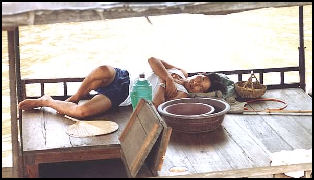
Describing the preparation of dinner in a Sichuan home, Brook Larmer wrote in the New York Times, ‘smoke billowed out of the kitchen, filling the room with an acrid blast of chili paste. Yang, in a blue chef’s apron, stuck his head out of the kitchen. Tears streamed from his hangdog eyes, but he had a grin on his face. Huiguo rou! he said — he was making the twice-cooked pork that is a Sichuanese specialty. Xue smiled up from her chair, holding a box of insoles she had embroidered to make Yang’s shoes more durable and comfortable on his long days driving. Her mother and brother were visiting, and Yang relished the chance to cook for a family again. A few minutes later, he emerged from the kitchen with a parade of dishes: chicken feet, cold sesame noodles, beef and potato stew and twice-cooked pork, all to be washed down with rice liquor. Yang called his new family to the table and, with a flash of yellow teeth, declared, Let’s eat!” [Source: Brook Larmer, New York Times, May 3, 2010]
Angie Eagan and Rebecca Weiner wrote in “CultureShock! China”: The author remembers being incredibly humbled by her first invitation to dinner in a Chinese home. The family of three adults had been assigned the attic of an old house. The door to the attic took up one-third of the floor space. Beds around the outside of the room took up the remainder of the space. It was only after the attic door was closed that the small table could be moved into the middle of the room to serve the meal on. In contrast to the space, the meal that was served was fit for a palace. The effort, relative cost and intent behind the meal has made it one of the best consumed by the author anywhere in the world.[Source: “CultureShock! China: A Survival Guide to Customs and Etiquette” by Angie Eagan and Rebecca Weiner, Marshall Cavendish 2011]
Patricia Buckley Ebrey of the University of Washington wrote: ““Chinese kitchens are different from Western kitchens. Often kitchens were not included in house plans. For richer families, cooking was done in the servants' quarters. In poorer families, cooking was done in the main room of the house or in a separate shed. In general, Chinese kitchens are more compact than Western counterparts. In the Chinese kitchen, the focus of activity generally centers on the stove, which dominates the kitchen space. In the space above the stove, there was often a nook for the kitchen god, who was said to protect the home. There is often a nook for the kitchen god. The kitchen god guaranteed domestic harmony. His image is on paper because it is burned each Chinese New Year, so that he can take a report of the family to the Emperor of Heaven. [Source: Patricia Buckley Ebrey, University of Washington]
Bureaucracy in China
Every Chinese citizen is required to carry an identification cards that contains the holder's photograph, ID number, name, sex and birth date. They are relatively easy to counterfeit. China is in the process of issuing new high-tech identification cards, with the first issued in Shenzhen in 2007. These plastic cards contain microchips that contain personal information such as work history, educational background, religion, ethnicity, police record, medical insurance status and landlord’s phone number. There is even discussion of adding an individual's reproduction history (as it relates the One-Child policy), credit histories, train travel payments and small purchases charged to the card.
Keeping track of every resident as a way of maintaining control over the population is a practice that has been done since Imperial times. The system worked well under the emperors and Mao because most people spent their entire lives living in one place. These days the system is inadequate in dealing with the all the people moving about in search of jobs and opportunities.
Many ordinary Chinese people increasingly complain that health, housing and education have become three “mountains” (unbearable burdens) on their back. Hanging laundry is a common sight in China. People have been told to shun driers even if they can afford them because of their energy costs. In the Mao era and to a lesser degree today, papers and documents were also needed to get apartments, and receive ration cards and other necessities and benefits. Visas were required on internal passports to travel from one town to another; and when they arrived at their destination hotel guests were required to register with the police.
See Separate Article CHOPS AND RESIDENCY CARDS (HUKOU) IN CHINA factsanddetails.com
Everyday Authoritarianism in China
Roland Farris wrote in Truthout: “I wake up this morning to the sun slicing warm, golden slits through the barred windows of my little apartment in Dali Old Town, one of southern China's most beautiful and relaxing cities. It isn't the ample sunshine that wakes me up, however, it's the rousing military band music that wafts in from across several courtyards and makes its way into our otherwise quiet corner of existence. The music itself wouldn't be so remarkable, even given its oddly archaic marching-band sound, like some fragment of mid-20th century authoritarianism that got trapped in the stratosphere and recently settled down back into my ear. [Source: Roland Farris, Truthout, February 5, 2012]
What is remarkable is its ubiquity. It is the same music I battle to suppress from my on-campus apartment in one of China's major cities. It is the same music that blasts every morning at precisely 7 AM and again at 4 PM on my top-level university campus. To me, it is increasingly the sound of China.
Accompanying the music is a voice calling out callisthenic exercises in a cadence that would be almost cheery if it didn't carry such grim undertones of mindless conformity. "Yi, Er, San, Si, Wu, Liu, Qi, Ba, Er, Er, San, Si, Wu, Liu, Qi, Ba," the high-pitched male voice encourages the often-absent students. This is a real-life equivalent of the "physical jerks" in Orwell's "1984." Twice a day, on the mark, speakers across the campus blast out this music.
Students at my university are obliged to participate at least once a week. There seems to be a club for those who want to show particular enthusiasm. I am told that these exercises along with their uniform marching music are obligatory daily routines on all school campuses up until the end of high school. Failure to show sufficient enthusiasm in one's daily jerks is grounds for academic penalties. This aspect of living and studying in China is something that it seems is often missed in the excessively positive and business-oriented coverage given by the mainstream media, and it is part of a troubling trend that I am most able to witness in the education system - but which extends to every facet of life in the Middle Kingdom.
Chinese Women Shoppers and What They Say About the Economy
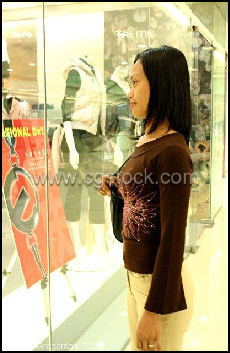
Shopping in Beijing Richard Komaiko wrote in the Asia Times, “Westerners often focus myopically on the growth rate of China's gross domestic product (GDP), which is roughly 9 percent per year. While this is an important indicator of prosperity, it must be considered in tandem with other important metrics, such as inflation and the increasing cost of residential real estate. China's consumer price index rose 5 percent in the first quarter of 2011. This means that the effective real growth rate in GDP was only 4 percent . On top of that, the cost of real estate in many cities is growing at 20 percent per year. Considering these numbers, put yourself in the shoes of the average recent college graduate in a city like Shanghai. [Source: Richard Komaiko, Asia Times May 25, 2011]
“You make a decent income, but you can't afford to make a down payment on a piece of real estate, so you rent for a few years. But because the price of real estate is growing many times faster as the overall economy, the longer you wait, the less you can afford to buy. And in Chinese culture, if you can't afford a home, you can't start a family, and so forth.”
Young working women are increasingly become major forces in the Chinese economy. Those with good salaries, by Chinese standards, of few a hundred dollars a month think nothing of plopping down $400 for a new cell phone with the latest 3G and MP3 features or $700 a new snowboard and gear to go with it even though they have yet to tried the sport.
An economic advisor for MasterCard told Reuters, “Urban women consumers will be spending much of their hard-earned cash on personal travel and related cultural and recreational activities, dinning out shopping, as well as buying cars and pursuing urban leisure lifestyles.”
Their spending habits, economists hope will offset the conservative spending habits of most Chinese and make the economic less reliant on investment. Favored brands by female consumers include LVMH, Christian Dior, Valentino, Swatch, Nokia and Coca-Cola.
Shopping and Consumerism in China
The Chinese really haven’t been consuming very long. In the Mao era there wasn’t much to buy. Now conspicuous consumption is fashionable, particularly in the coastal cities in the east and south and in Shanghai, and many urban Chinese spend their free time on the weekends at Western-style shopping malls. Consumer spending is highest among this between 20 and 49. The people born after 1980, when the economic reforms began ti take shape, are the “real driving force” of the consumer economy in China,
William A. Callahan of the London School of Economics wrote: “When I lived in China in 1985-86, I became obsessed with pencil sharpeners. They came in all shapes: televisions, telephones, and cars; tigers, elephants, and giraffes; pistols, Maotai bottles, and brandy bottles; violins, pianos, and Laughing Buddhas. In one year, I collected over 200 different pencil sharpeners. The Chinese party-state seems to encourage such obsessions. Its political campaigns from the 1950s to the 1980s produced not only a plethora of slogans, but also a wide range of collectable communist consumer items: Mao badges, propaganda posters, postage stamps, and mugs inscribed with political messages.”
Small store owners often sells items like rice, peanuts, eggs and sugar by weight and gave them to customers in flimsy plastic bags. In the Mao era, customers had their purchases wrapped in paper and carried them home in cloth or net bags. The practice continued until the 1980s when people began shopping more and more at supermarkets and carrying their purchases home in plastic bags. By the mid 2000s, three billion were being even out everyday, with many Chinese thinking nothing of tossing them to wind, creating a gargantuan litter problem. See Recycling, Environment, Nature
Because of a lack of refrigeration, the Chinese have developed the habit of keeping a potential meal alive as long as possible. Fish and lobster at restaurants are kept in tanks and ducks and pigs are slaughtered shortly before they are sold. When transported, pigs are inhumanely placed in cramped cages and stacked on three-decker vans. Thirty or forty are sometimes tied together and carried on the back of a bicycle.
China now contains many of the world's largest and most ostentatious shopping malls. Wal-mart appeals to local tastes by offering popular Chinese products like live frogs and eels and turtle blood. Some stores offers live river fish, eels and turtles that are slaughtered right on the spot. Sometimes customers catch them in fish tanks with nets, watch as a clerk guts and cleans them and takes them home in plastic bags along with the bloody organs. Shoppers turned up their noses at the idea of buying dead fish wrapped in plastic and Styrofoam.

Wal-Mart's live food section
Savings in China
China has the world's highest savings rates: between 38 and 42 percent, despite low incomes, compared to 5 percent in the United States. The Chinese have $1.7 trillion in household savings, or almost 70 percent of gross national product. Total savings in 2005 was equal to roughly half of GDP, compared to 30 percent in Japan and 14percent in the United States. Urban dwellers account for 70 percent of bank savings.
The Chinese have traditionally been savers who didn’t seek credit to buy consumer goods. Instead they saved first and then bought something. The Chinese have traditionally emphasized being frugal. One Confucian saying goes: “He who will not economize will have to agonize.” Many Chinese don’t even like to put their savings. Newspaper often run stories about people who have their savings eaten by rats.
In the Mao era it was common for people to save everything whether they needed it or not because people had so few things and one never knew when they or a friend might need it. Among the things that people refused to throw away were old clothes, tools, thermos and even plastic bags and cans.
Chinese save a lot at least partly out insecurity about the future. The dismantling of the iron bowl since the end of the Mao era has taken away the welfare safety net. People save because they don’t have an inadequate pension, they need to make sure they have money for emergencies, for old age and to educate their children. One effect of the one child policy is that old people have to rely on themselves not their children to take care of them.
The rate of return is low on household financial assets and there are of limited portfolio opportunities because there are few alternatives to depositing money in state-owned banks. It is also difficult for ordinary people to get loans. This means that Chinese have to save money to purchase big ticket items like houses and cars rather than borrow against future income.
In 2007, the annual inflation rate of 4.6 percent exceeding the one-year bank account deposit rate of 3.87 percent. This deterred many people from putting their money in banks. Many instead invested in stocks of real estate.
The government is trying to encourage people to spend rather than save as a way of increasing economic growth. It has imposed on 20 percent tax on interest on savings accounts. Economists say that savings won’t really stop and consumption beginning until Chinese have more confidence about there future.
Lack of Service in China
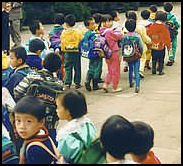
As was the case in the Soviet bloc, bad service was a fixture of life in Maoist China. Friendship stores, for example, were famous for their sullen, slow sales people. In hotels, the staff often seemed to were more intent in spying on you than helping you.
Some foreigners complain that things have not improved much. Customers at banks at train stations routinely have to wait in long longs and when they reach the window they are told to wait in another line. Sometimes things are not much better in restaurants. A Taiwanese-born American told the Los Angeles Times, “I’ve always had bad experiences with restaurant servers” in Beijing. “They just get basic salaries and so they don’t do much. Unless you complain.”
Workers are usually reluctant to perform tasks assigned to someone else out of fear of being blamed for making a mistake. This causes problems for tourists, because usually there is one person assigned to one task and one task only: one person who changes money, another who rents bikes, one person who takes care of maintenance and another who checks people into the hotel. If the person assigned to the task isn't there no else will do the task, which means that tourists have to wait around for the person to come back.
Things are improving. Now — especially with the Beijing Olympics coming up and China generally trying to improve is reputation among foreigners — there is more emphasis on service and pleasing the customer. Courses in etiquette and service teach shopkeepers to use polite language, wear socks to work, respond in a timely fashion and not cheat and follow customers around. Part of the training involves driving home the point treating customers well and developing long term relations are ultimately good for business.
In February 2007, regulations went into effect that banned shopkeepers in Beijing from getting angry at customers, acting impatiently, making sarcastic comments, grabbing customers or offering vague explanations. The rules were part of the effort to improve manners and address complaints about poor service in Beijing in preparations for the Olympics in 2008. There was no mention of the penalties for breaking the rules.
Shopowners complain that it’s the customers are the ones that need the politeness lessons. They complain about customers damaging goods in their stores and not paying compensation and agreeing to a price after a lengthy bargaining process and then walking away without buying anything.
We Survived!
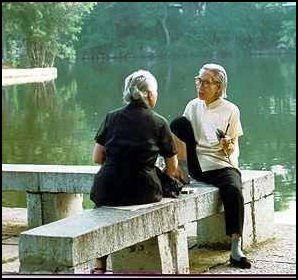 Victor H. Mair of the University of Pennsylvania wrote on MCLC List: “Here is a translation of the cartoon at left that has been circulating widely on the Chinese Internet. Virtually every line alludes to some sensational event of the past few years that has gone viral on the Chinese internet, such that there has developed a whole vocabulary of memes devoted to things that have led to the death of innocent citizens. The ones in the cartoon constitute but a small subset of the available corpus. [Source:Victor H. Mair, Professor of Chinese Language and Literature at the University of Pennsylvania, Danwei.com August 19 2011]
Victor H. Mair of the University of Pennsylvania wrote on MCLC List: “Here is a translation of the cartoon at left that has been circulating widely on the Chinese Internet. Virtually every line alludes to some sensational event of the past few years that has gone viral on the Chinese internet, such that there has developed a whole vocabulary of memes devoted to things that have led to the death of innocent citizens. The ones in the cartoon constitute but a small subset of the available corpus. [Source:Victor H. Mair, Professor of Chinese Language and Literature at the University of Pennsylvania, Danwei.com August 19 2011]
Man: I’m so glad you weren’t poisoned (to death) by gutter oil, Sudan red, lean meat essence, or toxic buns! Your house didn’t catch on fire! The bridge in front of your house didn’t collapse, right? You’re so lucky that the escalator didn’t malfunction when you went to work! It’s wonderful! We survived another day!
Woman: I was so worried you’d get run over by someone supposedly going 70 kph on your way to work! Or get stabbed eight times in a row! My gravest fear was that you would be accidentally injured by chengguan who were beating up someone else! I was also worried you would need to ride the high speed train! But I didn’t dare to call you, because I was afraid your cell phone would explode!
This piece of doggerel has been widely circulated on the Chinese Internet recently and complements the mood of the cartoon: Milk powder destroyed those born in the 2000s. Examinations destroyed those born in the 90s. Real estate prices destroyed those born in the 80s. Unemployment destroyed those born in the 70s. The chengguan destroyed those born in the 60s. Stepping down from one’s post destroyed those born in the 50s. Forced demolition and removal destroyed those born in the 40s. “Reform” of the medical system destroyed those born in the 30s. 2012 will destroy everybody else.
Top Problems Experienced by Ordinary Chinese
David Pierson wrote in the Los Angeles Times, “The Chinese put up with a lot living in the world's most populous country: standing on over-crowded trains for 40 hours; sleeping outside hospitals to secure a doctor's appointment; waiting more than a year to earn a driver's license.” [Source: David Pierson, Los Angeles Times, October 13, 2011]
In December 2011, the Chinese Academy of Social Sciences [CASS] reported that 70 percent of residents believe prices are too high and 40 percent can’t afford housing and say “housing conditions are poor.” CASS’s “2011 China Comprehensive Social Conditions Survey” found that the Top 10 Issues of Public Focus in 2011 were: 1) Soaring Commodity Prices (59.5 percent). 2) Health Care Availability and Prices (42.9 percent). 3) Income and Wealth Gap (31.6 percent). 4) Governmental Corruption (29.3 percent). 5) Unemployment (24.2 percent). 6) Housing Prices (24 percent). 7) Retirement Pension for the Elderly (16.6 percent). 8) Food Safety (15.9 percent). 9) Education Costs (10.9 percent 10). 10) Environmental Pollution (10.3 percent). [Source: China Smack, Translated from QQ, December 26, 2011]
“The 2011 China Comprehensive Social Conditions Survey,” published by “China Intelligence,” was done with random samples from 5 major cities, 100 counties and 480 villages in 28 provinces, autonomous regions or municipalities directly under the central government, where 6468 citizens — all over 18 years old and living in both cities and rural areas were surveyed. According to the survey, 75.3 percent of those surveyed believe the standard of living has risen compared to five years ago, and rural resident incomes are evidently higher than those of urban residents. Surveys measuring the life pressures of residents’ indicates that nearly 70 percent of the public feels the pressure of “soaring commodity prices affecting the quality of life”, though this is a 10 percent decline from 2008. Nearly 40 percent of those surveyed believe that “housing conditions are poor, can’t afford to build/purchase housing”.Apart from this, “China Intelligence” also conducted relevant research into Chinese family/household happiness. Most participants gave a relatively high score to their sense of happiness, and the average score is 7.2.
Nowhere on the list was there any mention of restrictions on freedom of expression, or the lack of democracy. When asked why this was so, Li Wei, one of the CASS researchers who had carried out the study, told the Christian Science Monitor, “Initially, he said, he and his colleagues had planned to ask about Internet censorship and the lack of freedom of expression. “But when we tested our questions in preparation for the survey, we found that villagers did not know what we were talking about,” he recalled. “They thought they had complete freedom because they don’t talk about politics, so they don’t have any problems.” “That is not to say that we think freedom of expression is unimportant,” he added quickly. “But it is not important enough to enough people in China to make it part of our survey.” [Source: Peter Ford, Christian Science Monitor, December 27, 2011]
Image Sources: Nolls site, Beifan.com, CG Stock, Picasaweb; Wiki Commons, Wikipedia, Asia Obscura ;
Text Sources: New York Times, Washington Post, Los Angeles Times, Times of London, National Geographic, The New Yorker, Time, Newsweek, Reuters, AP, Lonely Planet Guides, Compton’s Encyclopedia and various books and other publications.
Last updated October 2021
